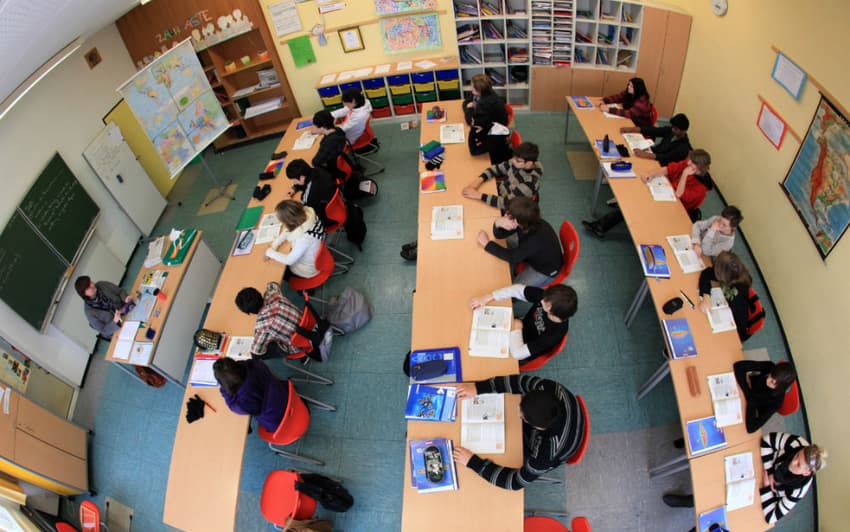Apprenticeship prospects bleaker for foreigners in Germany: study

The chances of finding training positions without an Abitur (final exams) are hard enough for young people in Germany. But it’s even more difficult for foreign youth in the country, a new study has found.
More than half of all young people without a German passport will not be able to find an apprenticeship in either the dual education system or school-based vocational system, according to a study published by Bertelsmann Foundation on Monday.
The study analyzes the prospective training opportunities for school leavers across the country in each state between 2007 and 2015.
“Those who graduate from high school with an Abitur have an apprenticeship practically secured," chairman of the Bertelsmann Foundation Jörg Dräger said.
"Those with lower or intermediate secondary school-leaving certificates on the other hand are often left empty-handed on the labour market."
An Abitur is a qualification granted by schools which prepare their pupils for university and to those who pass their final exams at the end of their secondary education, usually after twelve or thirteen years of schooling.
A dual education system combines in one course apprenticeships in a company and education at a vocational school.
For young people without German citizenship such as refugees, integration is important, Dräger added, stating that across the country special programmes such as language courses are on offer.
“Vocational schools are taking on an increasing number of integration and sociopolitical tasks - for this reason they must be equipped with financial, technical and human resources," said Dräger.
A total of 80,000 dual education training spots were offered by companies throughout Germany in 2015, according to the study. But from 2007 to 2015, the number of dual education applicants fell by 155,000.
The authors of the study write that it is “particularly dramatic” that between 2007 and 2015, the number of dual training positions in the country’s eastern states fell by 40 percent and the number of applicants decreased by 46 percent.
But not everyone agrees that the chances of young people looking to get into the job market after secondary school are bleak.
Federal education minister Johanna Wanka said on Wednesday that the number of new training contracts this year rose slightly to 523,000 - 3,000 more than last year.
The Bertelsmann Foundation however states that these figures released by the Federal Ministry of Education are not included in their study.
Meanwhile the German Trade Union Confederation (DGB) has called on companies to give more secondary school students a chance.
Socially tense issues are created “when companies complain about an alleged shortage of apprentices but turn secondary school students away," said DGB vice president Elke Hannack.
“Not even every second young person with a lower high school leaving certificate manages to get an apprenticeship right after their schooling. Firms must be open to these young people."
Comments
See Also
More than half of all young people without a German passport will not be able to find an apprenticeship in either the dual education system or school-based vocational system, according to a study published by Bertelsmann Foundation on Monday.
The study analyzes the prospective training opportunities for school leavers across the country in each state between 2007 and 2015.
“Those who graduate from high school with an Abitur have an apprenticeship practically secured," chairman of the Bertelsmann Foundation Jörg Dräger said.
"Those with lower or intermediate secondary school-leaving certificates on the other hand are often left empty-handed on the labour market."
An Abitur is a qualification granted by schools which prepare their pupils for university and to those who pass their final exams at the end of their secondary education, usually after twelve or thirteen years of schooling.
A dual education system combines in one course apprenticeships in a company and education at a vocational school.
For young people without German citizenship such as refugees, integration is important, Dräger added, stating that across the country special programmes such as language courses are on offer.
“Vocational schools are taking on an increasing number of integration and sociopolitical tasks - for this reason they must be equipped with financial, technical and human resources," said Dräger.
A total of 80,000 dual education training spots were offered by companies throughout Germany in 2015, according to the study. But from 2007 to 2015, the number of dual education applicants fell by 155,000.
The authors of the study write that it is “particularly dramatic” that between 2007 and 2015, the number of dual training positions in the country’s eastern states fell by 40 percent and the number of applicants decreased by 46 percent.
But not everyone agrees that the chances of young people looking to get into the job market after secondary school are bleak.
Federal education minister Johanna Wanka said on Wednesday that the number of new training contracts this year rose slightly to 523,000 - 3,000 more than last year.
The Bertelsmann Foundation however states that these figures released by the Federal Ministry of Education are not included in their study.
Meanwhile the German Trade Union Confederation (DGB) has called on companies to give more secondary school students a chance.
Socially tense issues are created “when companies complain about an alleged shortage of apprentices but turn secondary school students away," said DGB vice president Elke Hannack.
“Not even every second young person with a lower high school leaving certificate manages to get an apprenticeship right after their schooling. Firms must be open to these young people."
Join the conversation in our comments section below. Share your own views and experience and if you have a question or suggestion for our journalists then email us at [email protected].
Please keep comments civil, constructive and on topic – and make sure to read our terms of use before getting involved.
Please log in here to leave a comment.